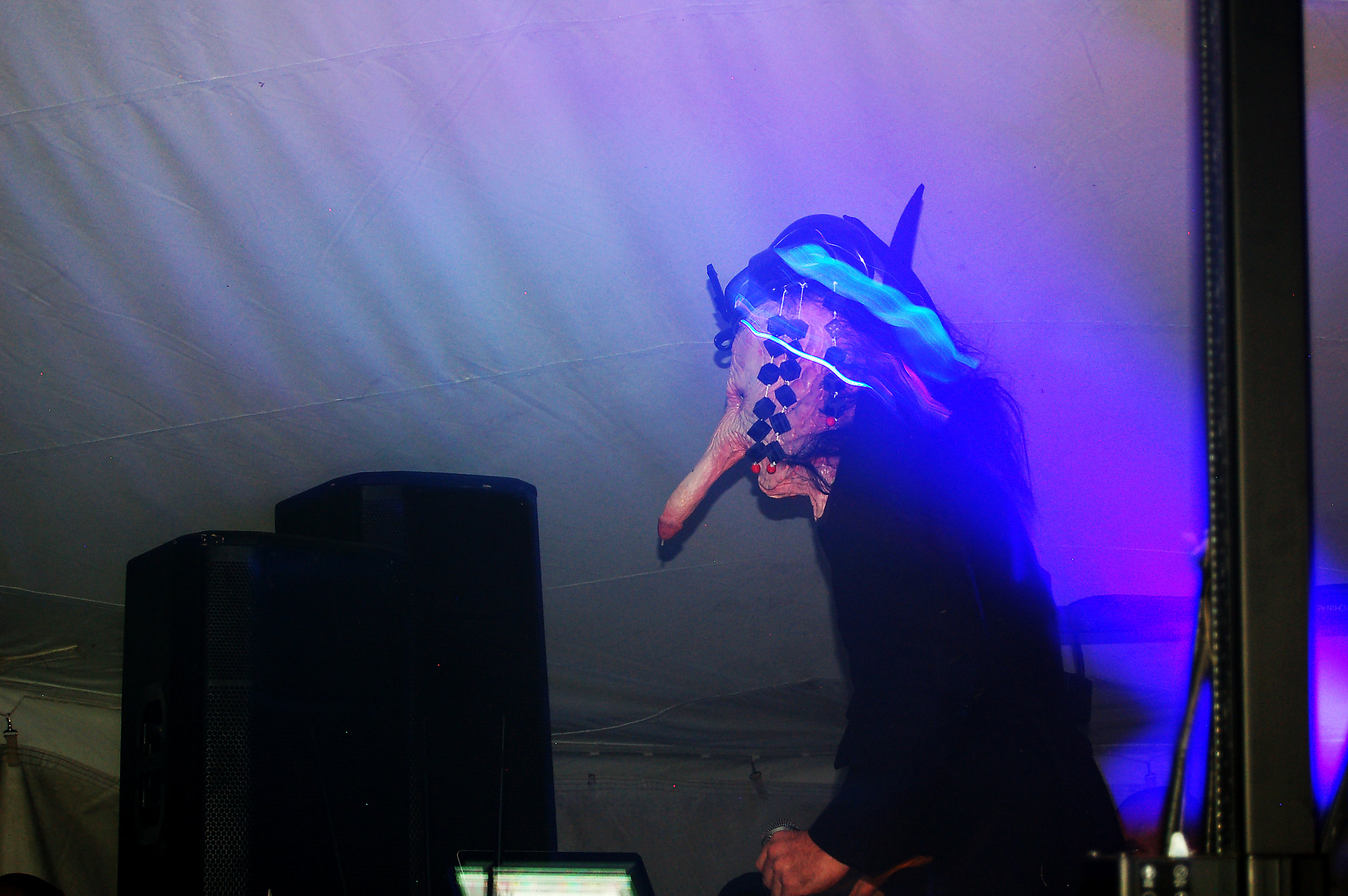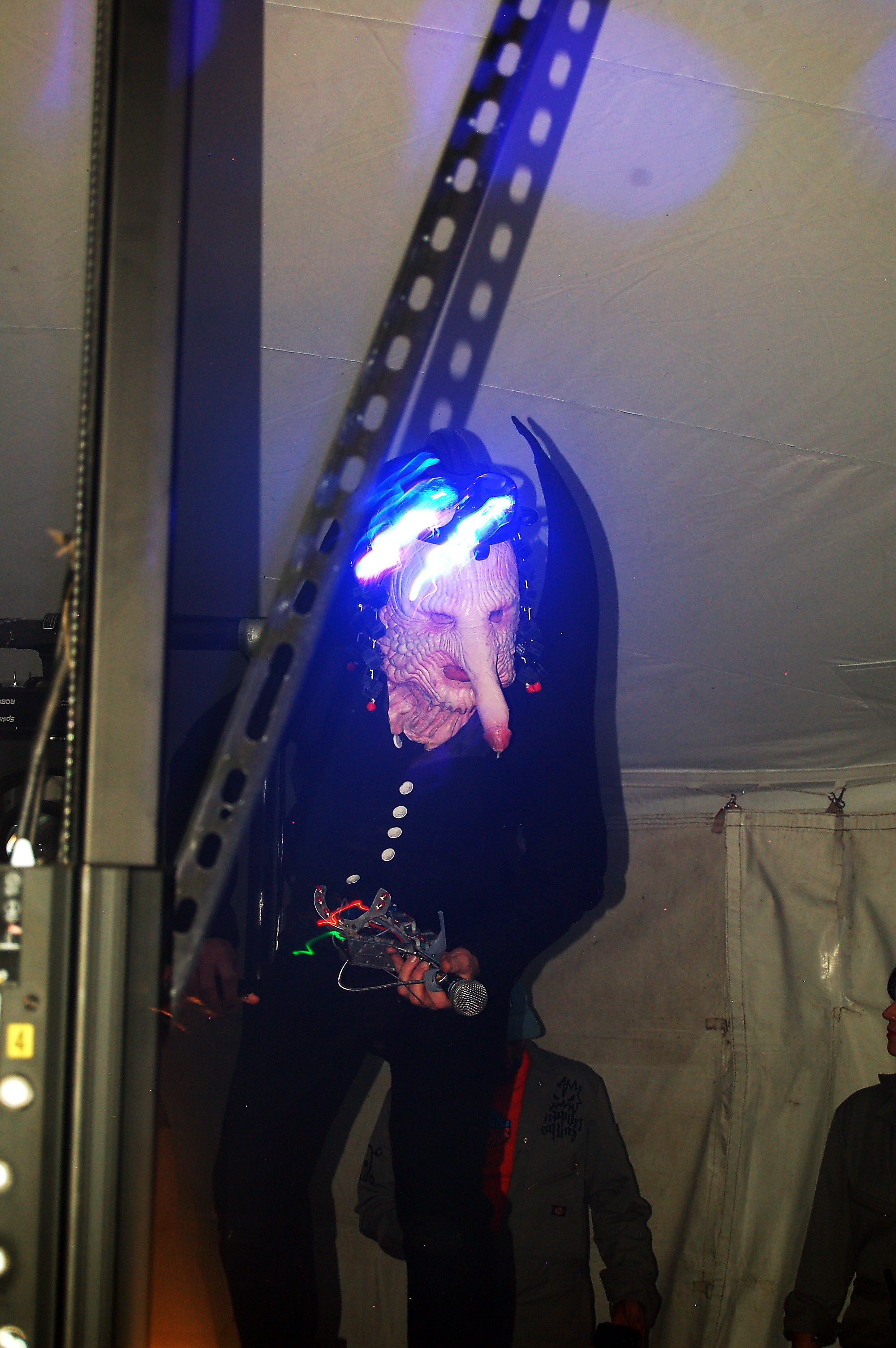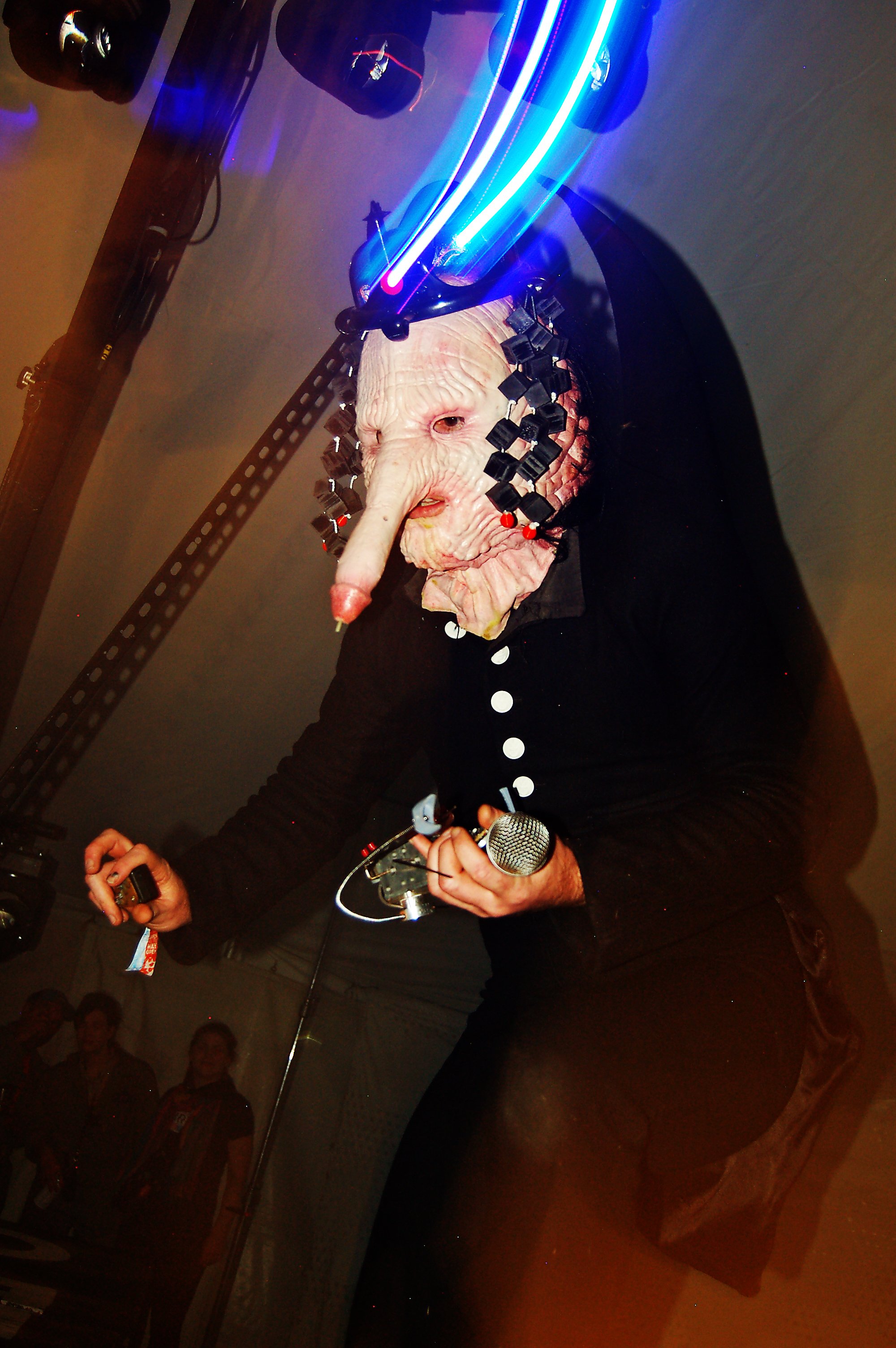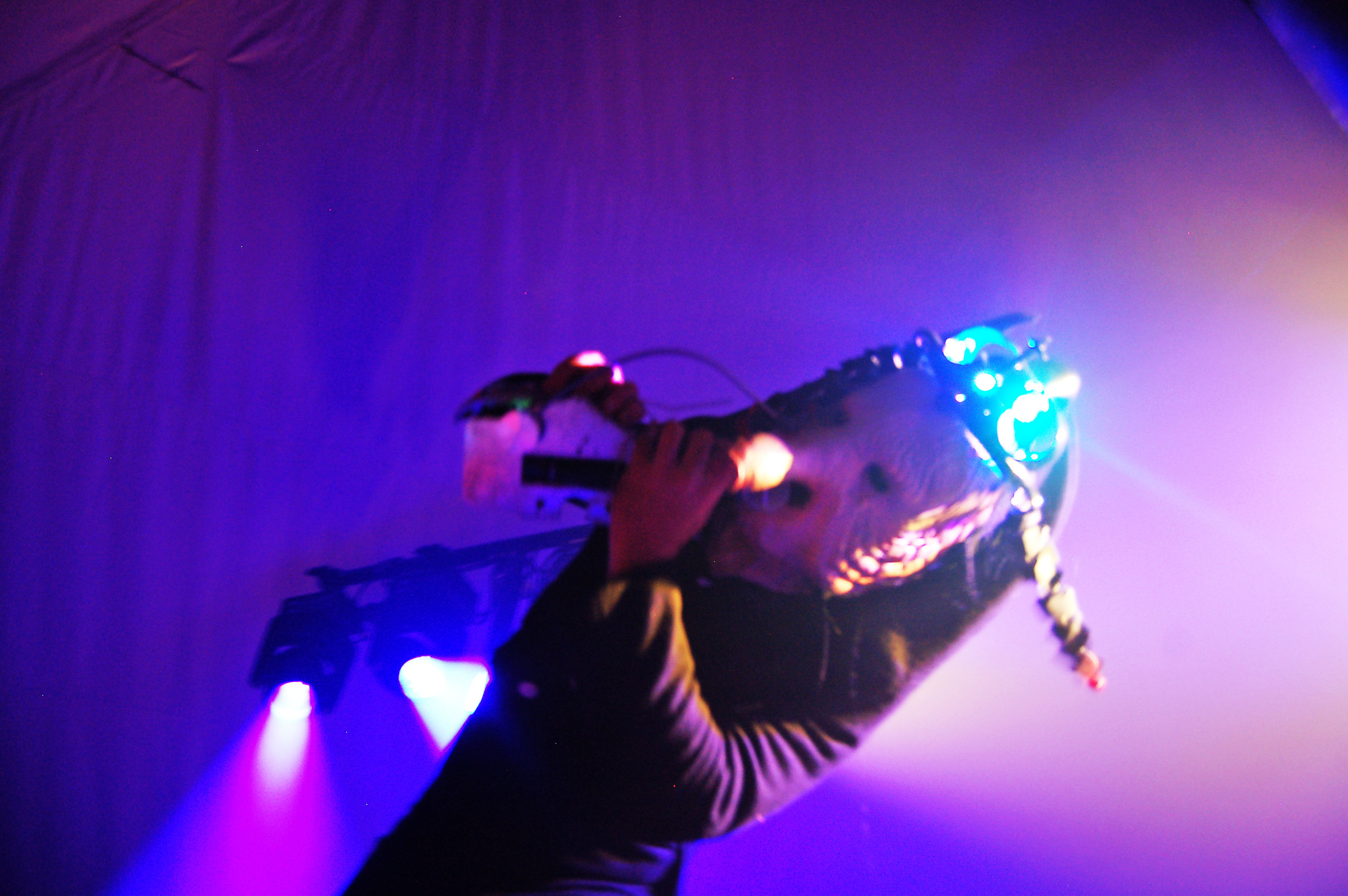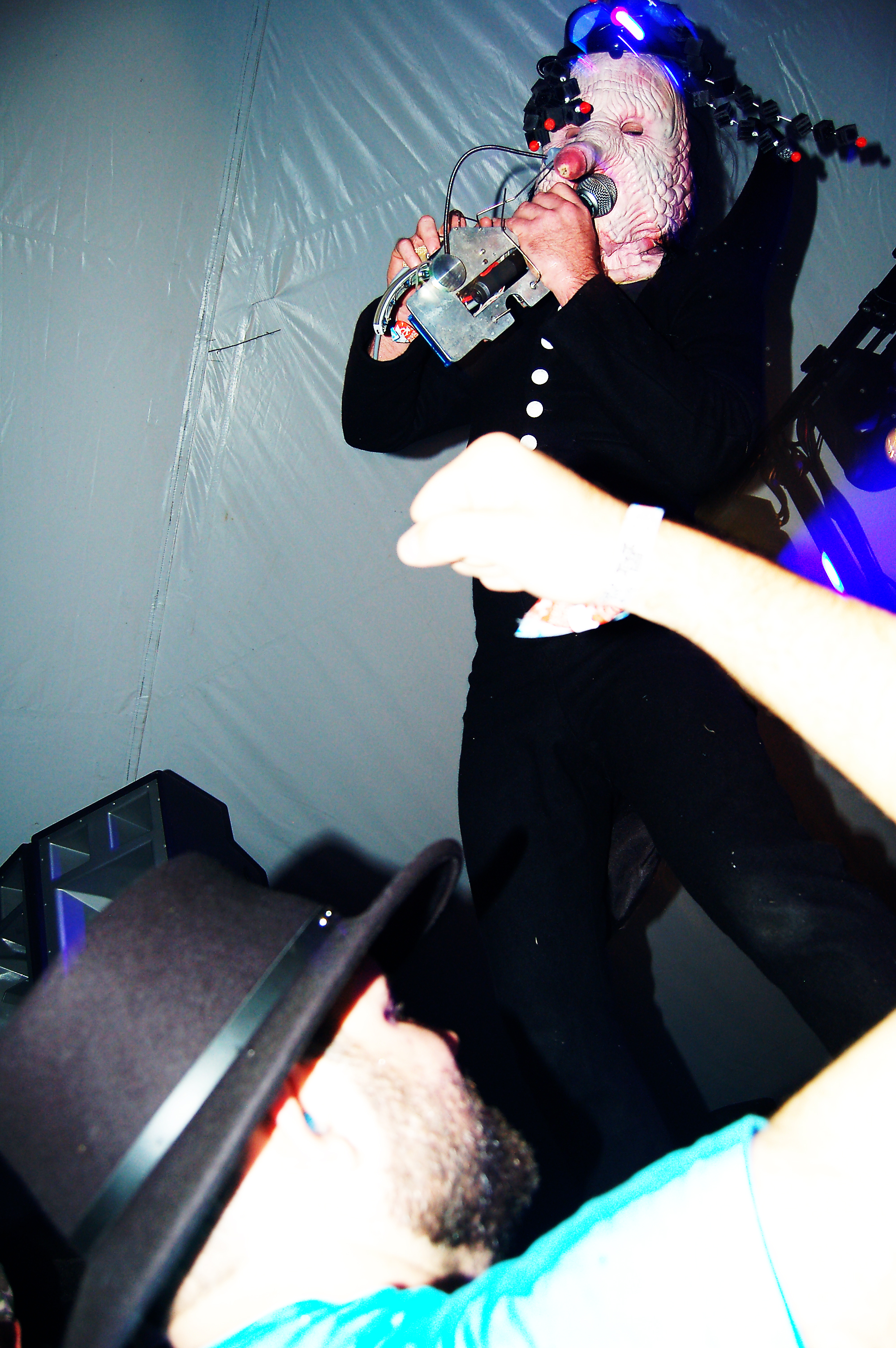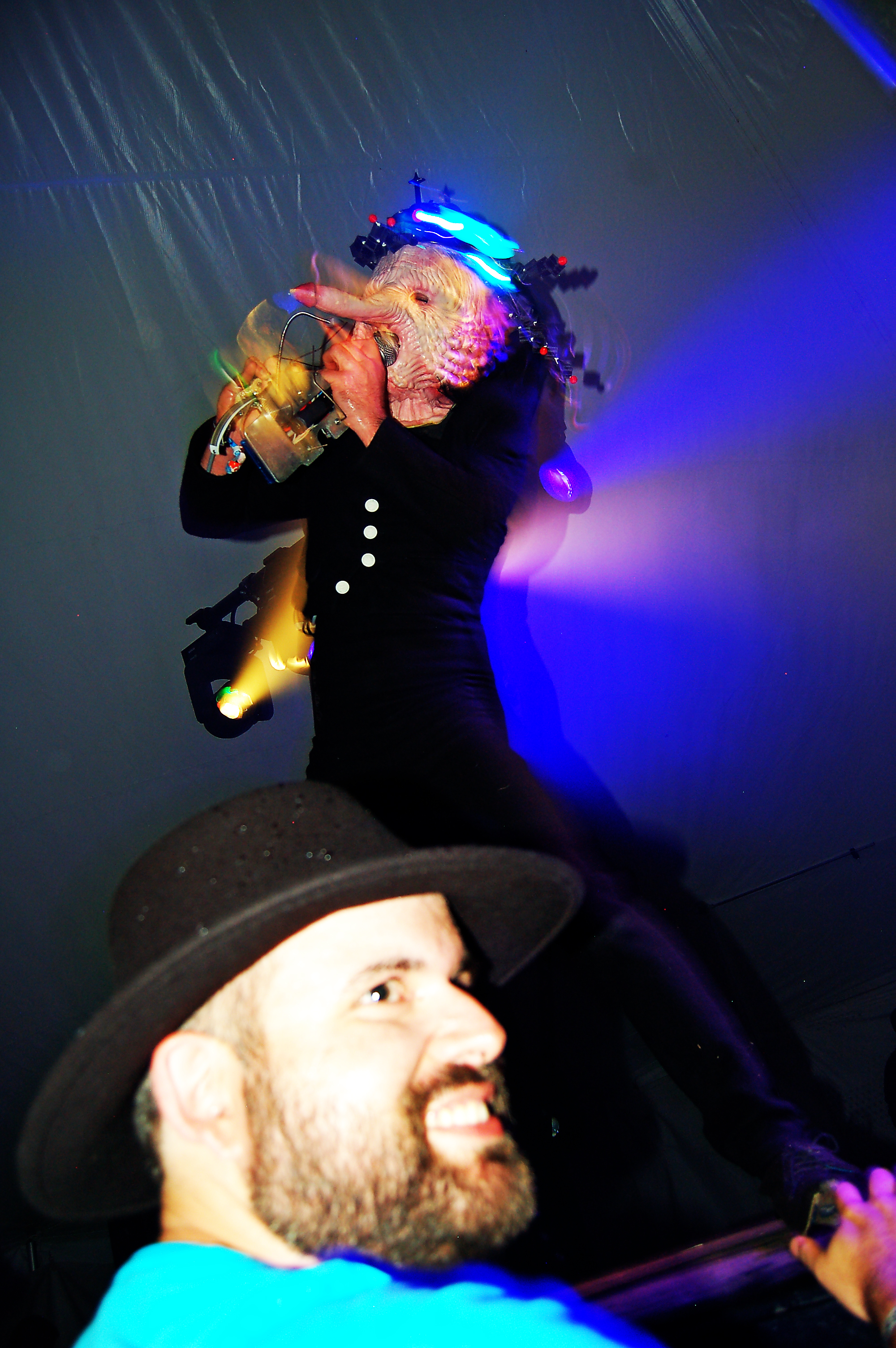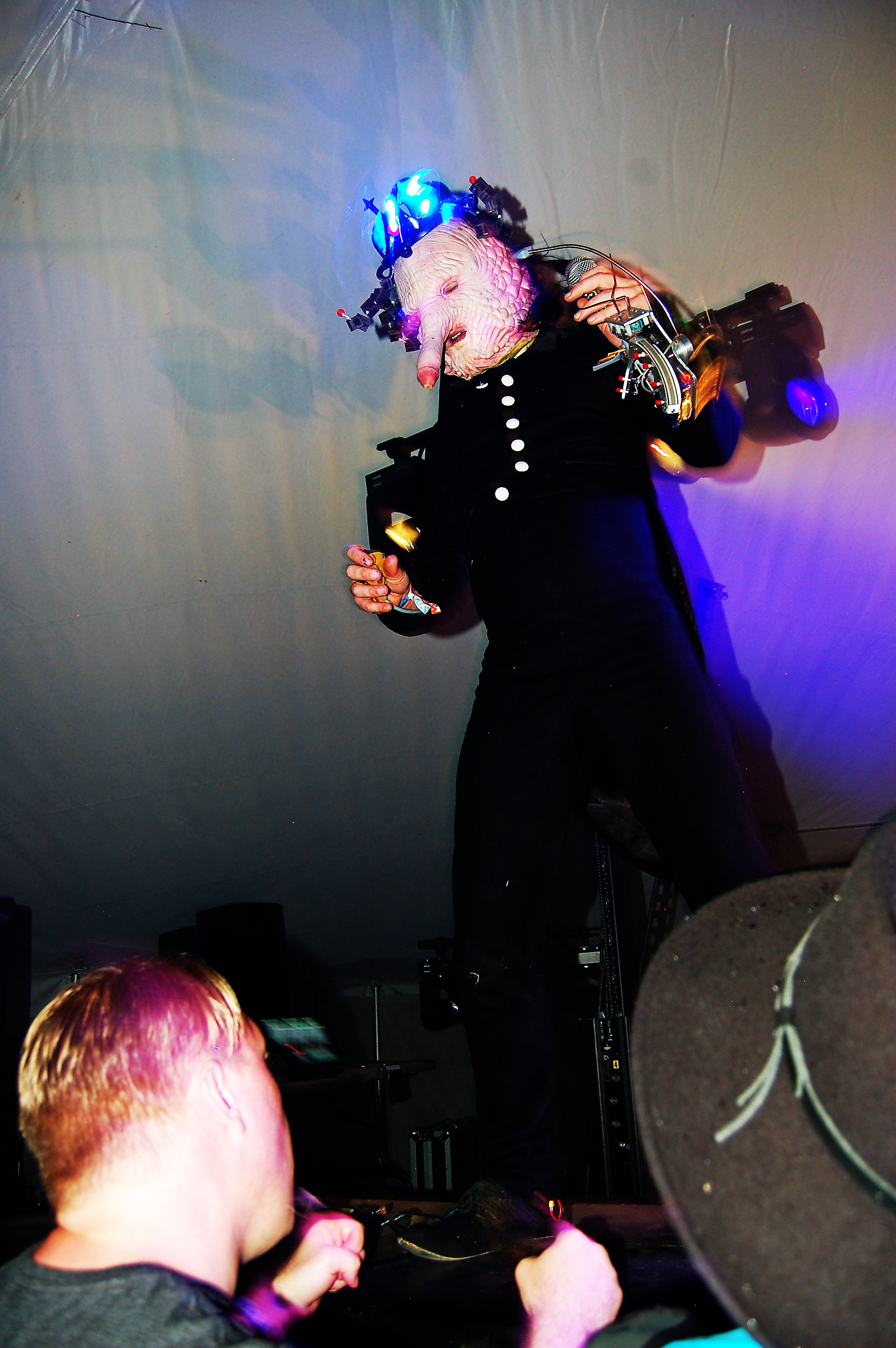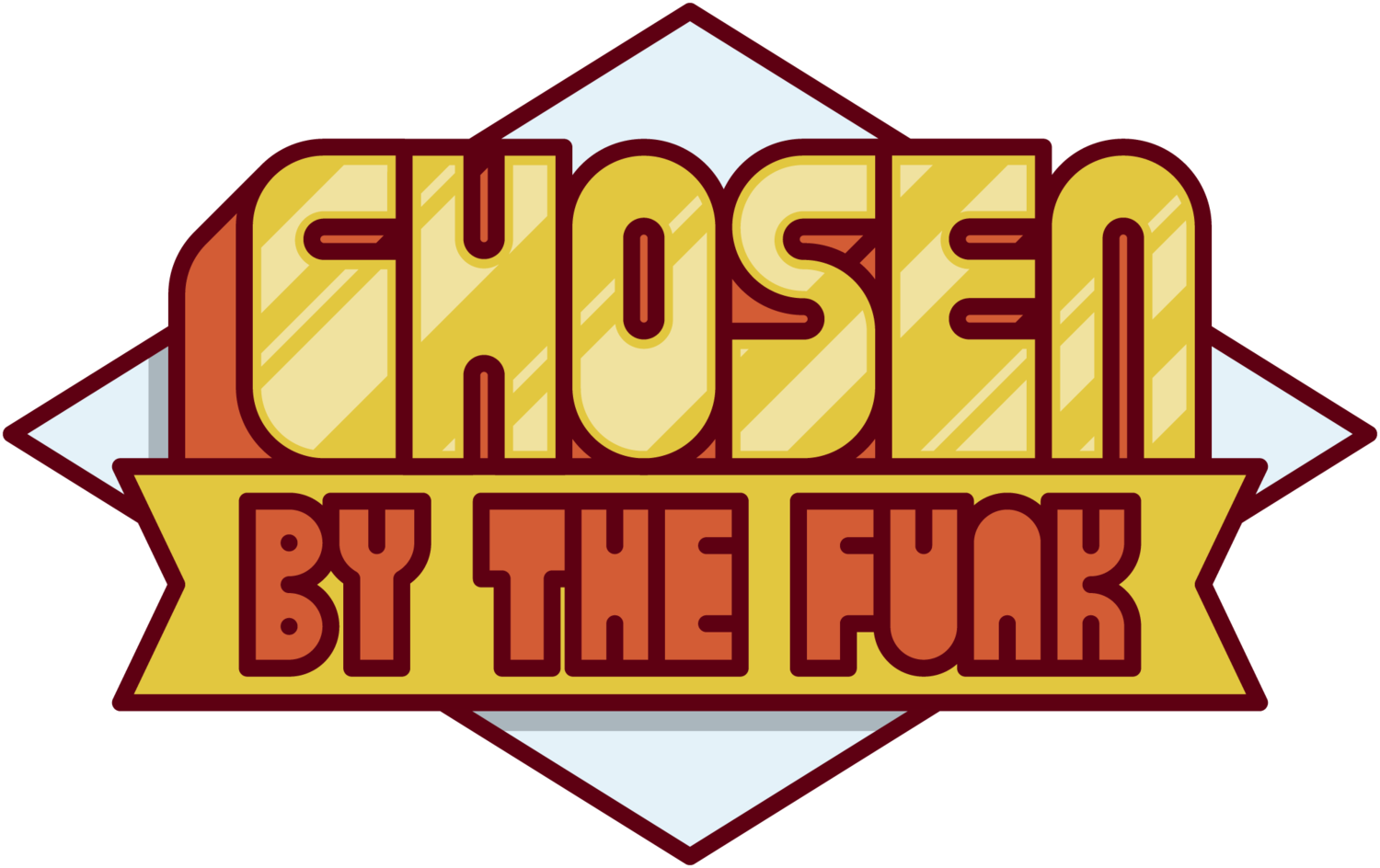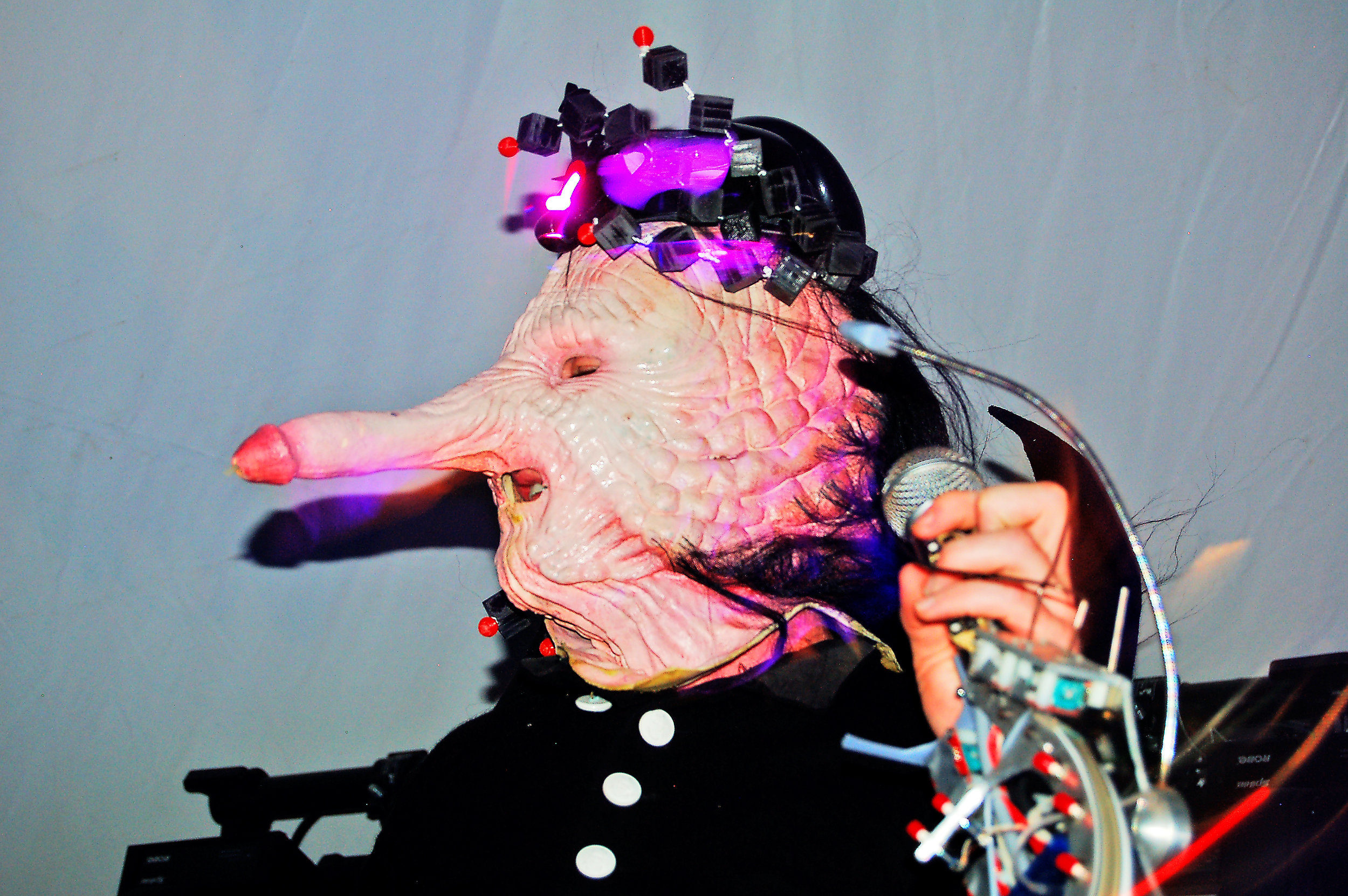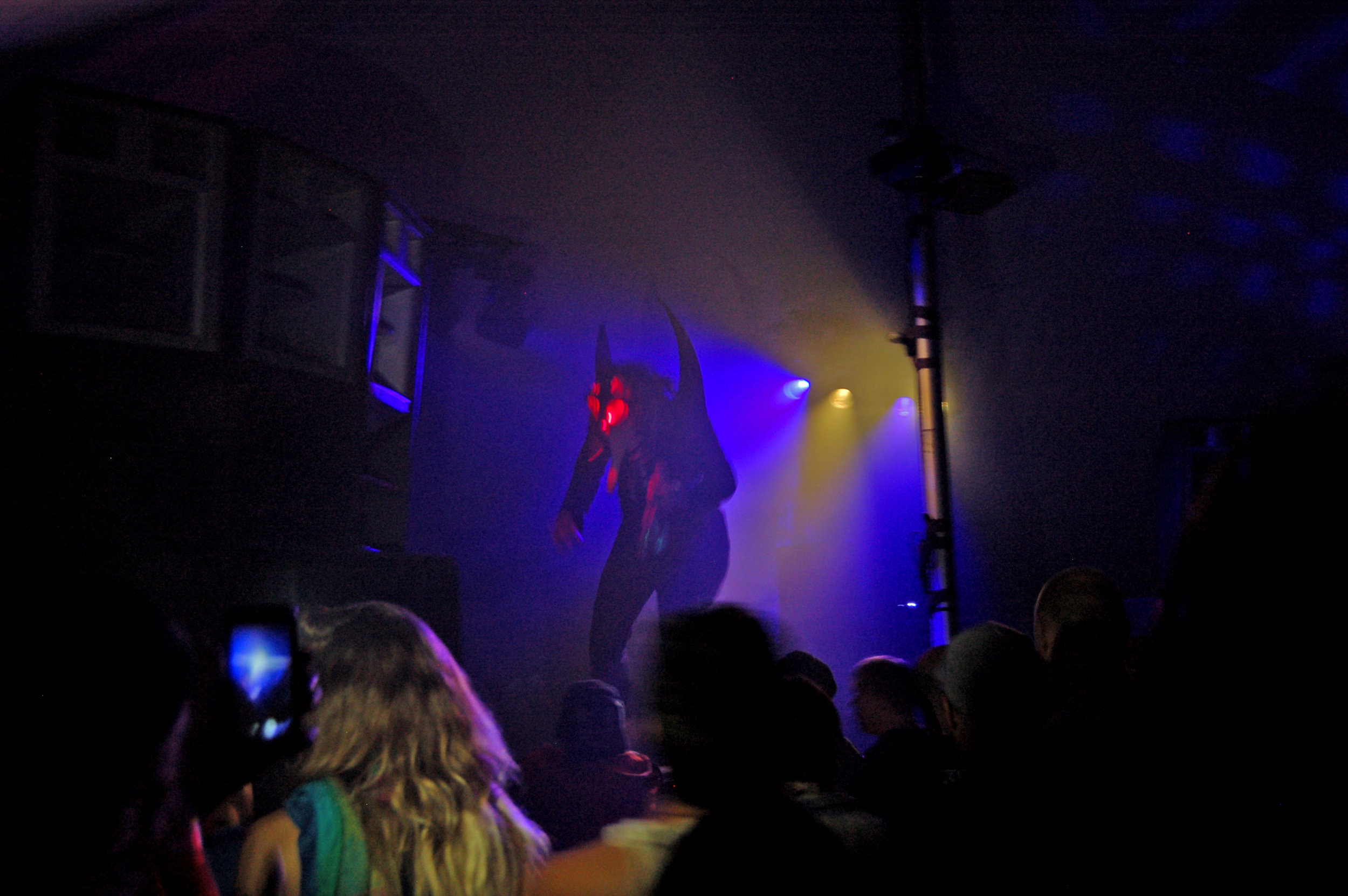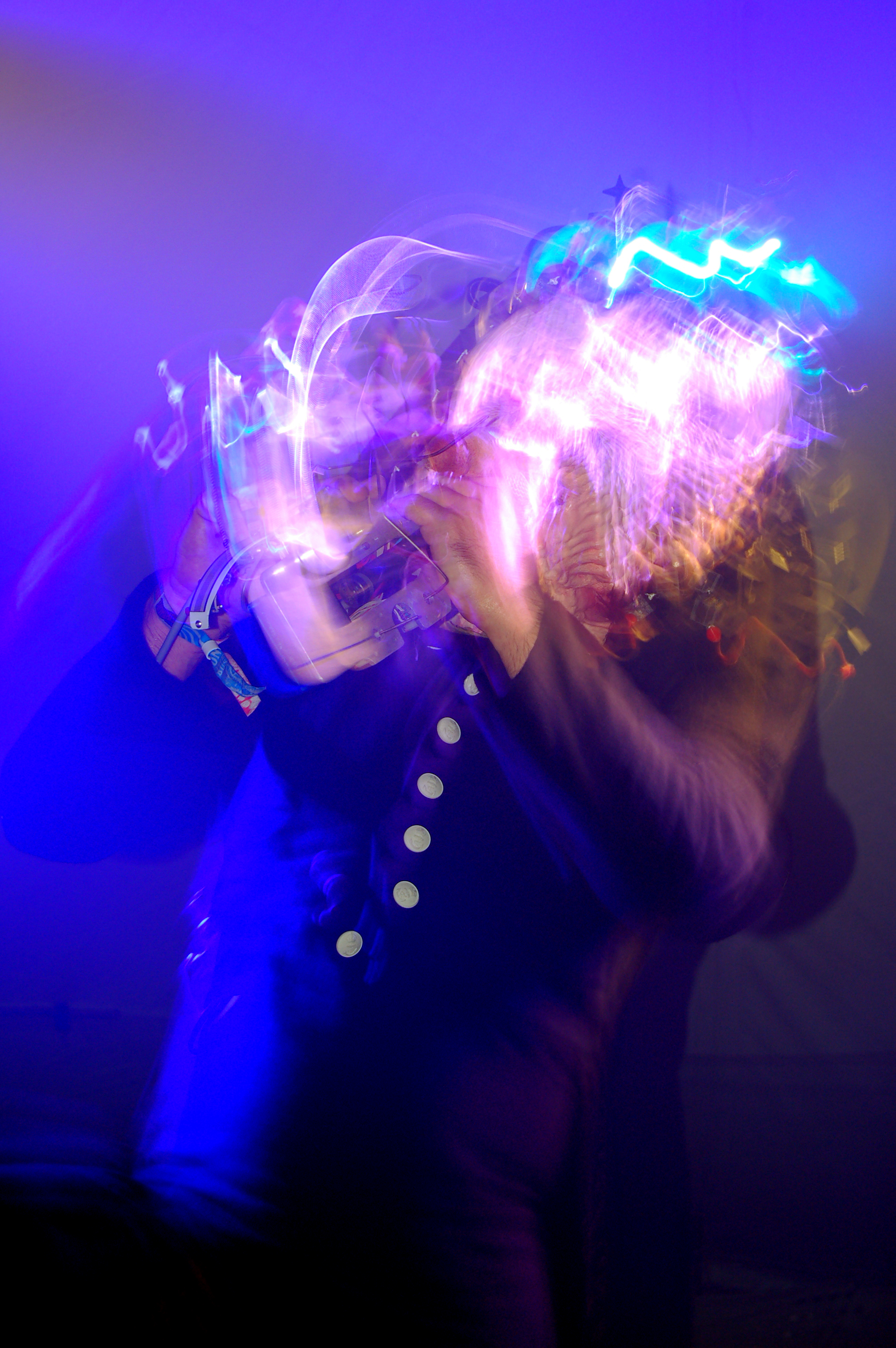Even Furthur 2017: Thus Spake Anklepants
Before this summer, my sole experience with the electronic musician Anklepants was having heard his Boiler Room set had caused quite a stir; I didn't actually watch it but I read about it and was aware of it. The video is one of Boiler Room's most viewed owing both to the polarizing reactions it elicits as well as the weirdness of the clown with an animatronic penis-nose playing some seriously strange (yet danceable) electronic music -- not exactly their standard fare.
In the run up to the line-up announcement for Even Furthur 2017, people were throwing out guesses as to who may be playing. When someone suggested Anklepants, I laughed it off. It turned out the joke was on me when the line up came out, as he actually did get booked to play the festival. I went and watched the Boiler Room set after the line up dropped, and suddenly Anklepants was the act I was most looking forward to.
His set at Even Furthur blew my mind in so many ways. The innovation and originality of his performance left a huge impact on me - I had to take a short break from listening to music after his set because it simply was not Anklepants. Using controllers that the artist himself built, his entire body is turned in to a wireless musical instrument, allowing him to perform an entire set while hopping around on speaker stacks. I wrote a review of the performance in my recap post of the festival if you would like to hear more detail about how it went down.
I had been trying to get in touch with Anklepants ahead of the event for an interview, but we ran out of time. I'm glad it ended up that way, as it was much better to do it after he turned my world upside down. On the day following his performance, an opportunity presented itself and I asked Drop Bass Network head Kurt Eckes if he could connect me with Anklepants. Having felt the way I felt about his performance, it was surreal to meet him and I almost didn't even know where to start. Once we got going, we had a very interesting conversation about his set at Even Furthur, the evolution of his instruments, his musical influences, and more.
Beyond the jump is the interview nearly in full, some of it was left out to keep the piece to a reasonable length. BUT FIRST: here is 10 previously unseen minutes of raw footage from the Anklepants performance at Even Futhur 2017 that I shot, with no editing.
How was your performance at Even Furthur for you?
It was brilliant, it was a really good show. The tent was full the whole time, everyone was having a good time. It sounded good for me, it was really good.
How would you say that venue rates as a performance space for Anklepants?
It was perfect. It’s more just when people are interested like that and everyone is excited, and it’s full and it’s a good sound system, you know, for me, a good temperature. Everything was perfect. Everyone that works here is really friendly, so it just makes everything good. It’s too easy in the end when it’s like that.
I’ve been following your posts in your Facebook group about your mask designs, was that ejaculating nose a new thing?
No, that’s been there for maybe, I think about 4 years now. I add new things and alter the old things all the time. I’ve recently re-built all of the mechanics, so that got some little changes. I always post pictures when I’m doing testing. I have to test stuff constantly, every flight I do, I have to pull everything out and test it. If one wire is off somewhere, it could kill a whole bunch of controls somewhere else.
In your Boiler Room set, it seemed like you were going to your computer during your performance, but at your performance at Even Furthur I didn’t see you touch your computer once, is that a recent development?
Boiler Room was about three or four years ago now, in that time the system has changed. It changes every tour, and sometimes even in between shows. All the controls that I used to do on the machine, like you say when I went to the laptop, I now have those on me somewhere, whether it’s more buttons, or another accelerometer. Since that system there’s another 20 or so inputs or more. Maybe 30 more inputs since then. So I’ve done a massive upgrade before the last U.S. Tour. I don’t want to go near the computer, I’m trying to move away from that whole thing. I’m not a DJ, and I’m trying to make a point of that. That’s what I’m interested in. I try to give myself as much input control as possible to hopefully end up in a place that I don’t know why I’m there. I want to get close to everyone and put on a show.
I noticed during the performance you were doing a little hop step, were you just putting on a show or is there a controller in your shoes?
I have four sensors in my shoes, that signal goes wirelessly to my computer, into Max MSP which then triggers samples. My right-hand accelerometer selects the sample, so I have to hold a button. So I hold a button in my right hand, that turns on the sensors and then every step will trigger a sound, and depending on where it’s positioned, it decides which sound gets triggered. Then in my right hand on the microphone, I can hold other buttons over the top of that, and then the accelerometer in my other hand can modulate those sounds with effects, and then on my back I’ve got another accelerometer. Everything is connected, the whole system works that way. It’s the same with the vocals. I can sing, then hold a button which will turn an effect on, then I can move the accelerometer or modify a parameter, I can press or pull the joysticks around and it will send that input into another chain of effects. The whole system is like that. Then I can press buttons in the other hand. It doesn’t matter what part of my body I’m using, if one part of my body is being used, the other ones are modulating that part if you get what I mean. It’s just however many inputs I can, in my head, decipher. It’s kind of like having more limbs. The concept that a lot of people do with electronic music, a controller has a lot of knobs and faders and buttons. I’ve got all that same stuff but then I have accelerometers. You can only press a certain amount of buttons or turn a certain amount of knobs with your hands, so it’s like I’m an octopus. People often think that I’m doing some dance, but I’m actually modulating stuff the whole time. I would say the only movements I do that aren’t for that are just moving my head so I can see. Every other movement is modulating something.
Is there anything you’re working on at the moment to expand your trigger options?
I want to have things in the crowd as well. Like, big inflatable balls with sensors in them and things like this, so I can throw them into the crowd and the movement of the ball will control something I’m doing. I could hit a button and then the ball would change the pitch of my voice or control the speed of the track or anything so that the crowd could feel like they are sort of partaking in it. But people are going to grab them and try to smash them. I need to think of a way that’s more controlled. I’d have to think of a material to make it big enough that they can’t really grab it, but I’m not in the position for that right now. A big band could pull that off easy, but I don’t have that much money, I’d have to think of a way to do it cheap and bulletproof.
Do you make all your gear yourself or do you have people helping you?
Up until last year, I built everything myself – I still build everything myself, all the masks, all the electronics, I do all of it. All the Max MSP stuff, I build everything. The only thing, recently, I had some help from an electronic engineer, Seb Madgwick, who is in the UK, he supplied me with his IMU units, which are kind of the hub for the wireless stuff on my microphone suit, and he also helped me with some C+ coding, wrote me a library and showed me how the library works, then I do the coding. So he really helped me, it’s the first time I’ve had an engineer give me some guidance with coding. In the end, I do it all myself, but he provided a framework. I post and talk about him whenever I can because he’s a guy that’s building things that get used in a lot of industries, with sensors. The IMU units have an accelerometer, a barometer, a gyroscope, they have all these sensors on-board, and they are used in many industries, they are like a wireless transmitter/receiver. He also is building other electronic instrument interfaces for other artists, like Imogen Heap. She uses input control stuff and those guys build all of her stuff. She’s a really famous performer, and she does very different stuff than me, but at at the same time, there’s really no one in the world in his realm that’s like a doctor of engineering that’s putting the effort in music input control. He’s been so helpful to me, just to have an engineer there that I can ask questions, something that would normally take me a month to work out by myself, I can ask him and solve the issue much quicker.
Have you been doing the same set all through your U.S. tour? How much of your set was improvised?
I’ve only done two shows on this tour so far and both shows have been different. Some parts change and some parts I’ll leave the same. As for improvised sections, I can manipulate the track quite a bit, it’s not in total multi-track, I can really chop the track up pretty savagely and I can sample bits of it and I can sample my voice. So I can kind of turn tracks into something pretty different. Most of the improvising I do is in the vocals, and just between the vocals and the amount of manipulation I can do to the track, it’s enough to turn the track into something pretty different. There are some tracks that have certain vocals, but the rest of the time I am improvising all of the vocals, so it’s always different. Between shows, I’ll change the set quite substantially, it depends on how long the set is, what kind of show it is. A show like [Even Furthur], I tried to make some of the straighter sections a bit longer. It was only an hour to work with so it was a bit tricky, but at the same time I want to play as much different music as I can, and sometimes I have to sacrifice the flow, it ends up more like a band where they play a song and then they stop. There’s quite a lot of tempo changes, a lot of endings and introductions of songs. It’s different every time, no matter what, even if I play all the same songs it’s going to be completely different. I was always into stuff that was all over the place and I like a lot of different genres all together, and I think that influence has rubbed off on me.
What are some genres that are influencing you presently?
I’m influenced by everything. For the last few years I’ve been addicted to drone kind of music, this kind of loop-based drone. The only problem I have with that music is it’s not long enough, I listen for that stuff for like ten hours at a time. It’s really addictive, it kind of puts your mind into a meditative state. I sleep a lot with it on. I listen to anything and everything. I listen to a lot of Arabic music and Ancient Greek music. I’m really interested in ancient music, in micro-tonal tunings and theory, I’m trying to move away from 12 tone equal temperament and going back to a lot of the old mathematical theories and old cultural tunings that have kind of been lost in a rapid way like languages. I played some of my new tracks that aren’t finished at all, they still don’t have any vocals, but I love all those rhythms and tunings and instrumentation. I have a lot of Arabic instruments like Ouds and Saz and Turkish Ouds, and a Persian Santur. I've been experimenting with these for many years now, I first bought an Oud in the tunnel in Istanbul in 2009. A lot of my new instruments will have those things in them. Soon I’ll have a microphone with a harp on it, and I’m building these other harp-like stringed instruments that also have a microphone and control stuff built in. I will tune them to the ancient scales, and use a lot of different notes, not using the conventional 12 tone equal temperament scale, which I think is a big part of music that’s being overlooked. People are really into signal processing and effects processing, but there’s so much to do with just harmonies. It’s this weird thing in music that everyone’s overlooking. Everyone is using 12 tone equal temperament, imagine everyone in the whole world spoke only English, it’s the same. That 12 tone equal temperament to my knowledge was done by a Chinese mathematician, it’s an amazing piece of mathematics, but there’s tunings and musical theory stuff that’s disappearing at the same rate of language and culture in the world. I’m trying to maintain that stuff and explore into new harmony, you can do so much with just the notes you harmonize, you can create rhythm and different effects and moods and things that haven’t been heard before.
You post videos on social media about building and testing your equipment, it seems you are interested in giving your fans a look inside your creative process?
Often when I play a new place for new people, I don’t know if they’re looking at the mask or watching what I’m doing or both, it seems like the next time I play for them they go a little crazier, they stop looking at me so much. I like it when people can’t see me so well, when the lights are really dark. I can get a better idea of what they think and feel about the music. Obviously the appearance is such a prominent thing, and I think the other stuff gets too lost. I was always someone that kind of hid what I was doing a bit, but lately I’ve been trying to show people what I’m doing and how I build it. So they start to go ‘hang on, it’s not the cock-face’. Honestly I don’t put any time into that, I built it once and I re-build it to make it lighter. I just put that thing on. The other stuff I work 24 hours a day on. That thing’s just like putting on clothes before I go out in public. The stuff that I work on is the music and all the instruments, I put all of my time into those. I really work hard on that stuff so I’m trying to make that a bit more obvious to people, so they really have a look at what I’m doing, rather than say ‘oh, dick face guy!’, that’s the least important part.
Do you have any final words for the Furthur Family?
Keep doing it the same as you’re doing it. Everyone is super friendly and that radiates through the whole thing, it makes it an easy time. There’s no one with any attitudes and everyone’s so friendly. People don’t seem super wasted, not overly wasted anyway. You go to some things and everyone’s so fucked up. Everyone seems to respect each other. The line up is totally all over the place, and I like that. That’s something, when I first moved to Berlin for example, a lot of the parties that I used to play at and go to, every act on the line-ups was from a completely different planet. That’s a pretty good thing, it’s important to appreciate music rather than a marketing strategy. A lot of the time, genres are nothing but marketing. Having festivals like this is important, where everyone is actually thinking about what they’re listening to rather than ‘oh, look we’re in this place we don’t have to think any more’. I think it’s good when there’s a whole bunch of completely different shit going on. It’s like introducing people to your friends, or taking someone to a new place, or trying a different food. It should be a simple action like that, it shouldn’t be ‘oh this is the coolest thing, and now we’re just going to fill up the line-up on a scale of who is apparently the coolest’. That is just horrible! It’s a marketing concept. It’s important to have festivals like these that are the opposite of that.
